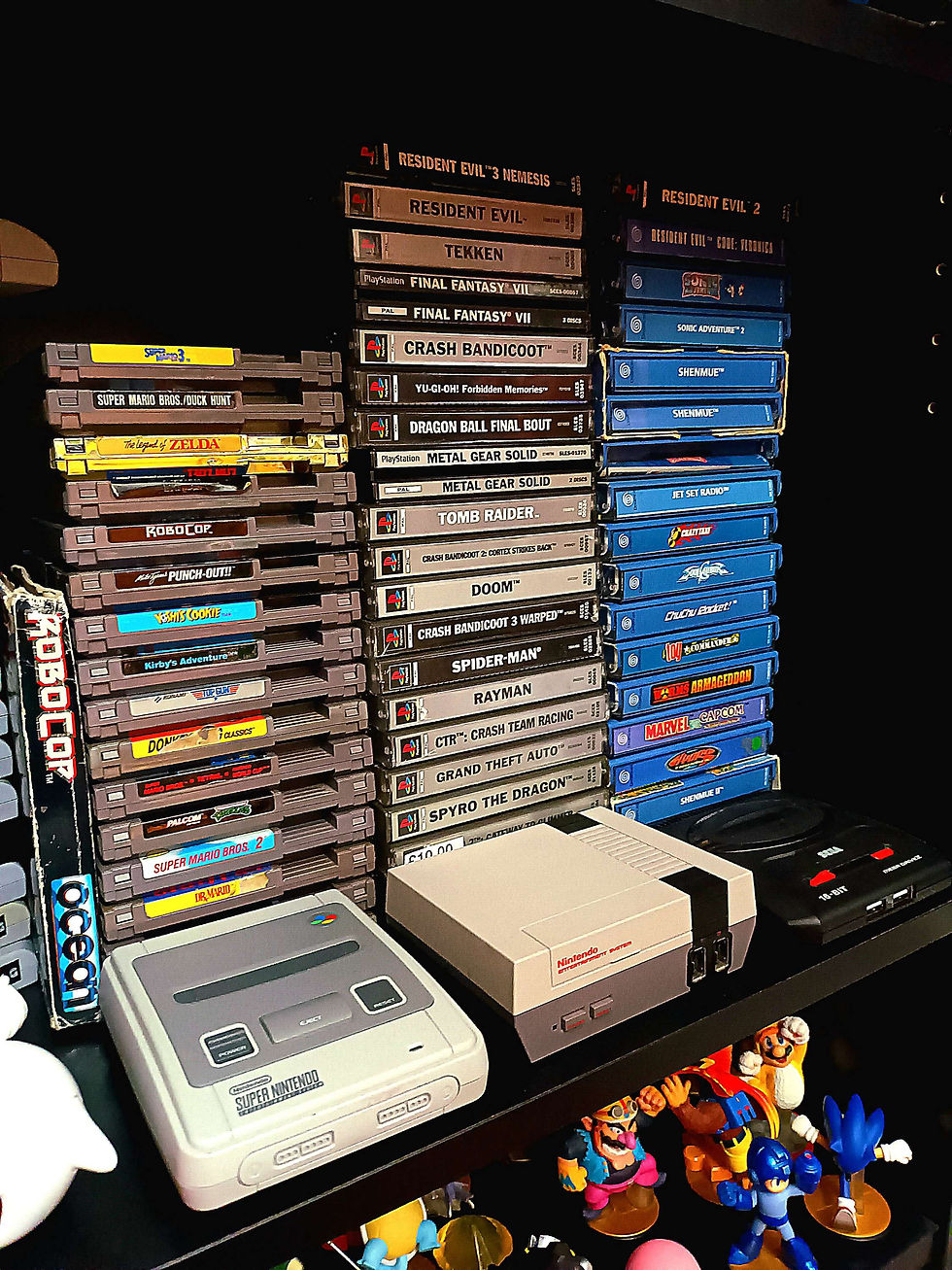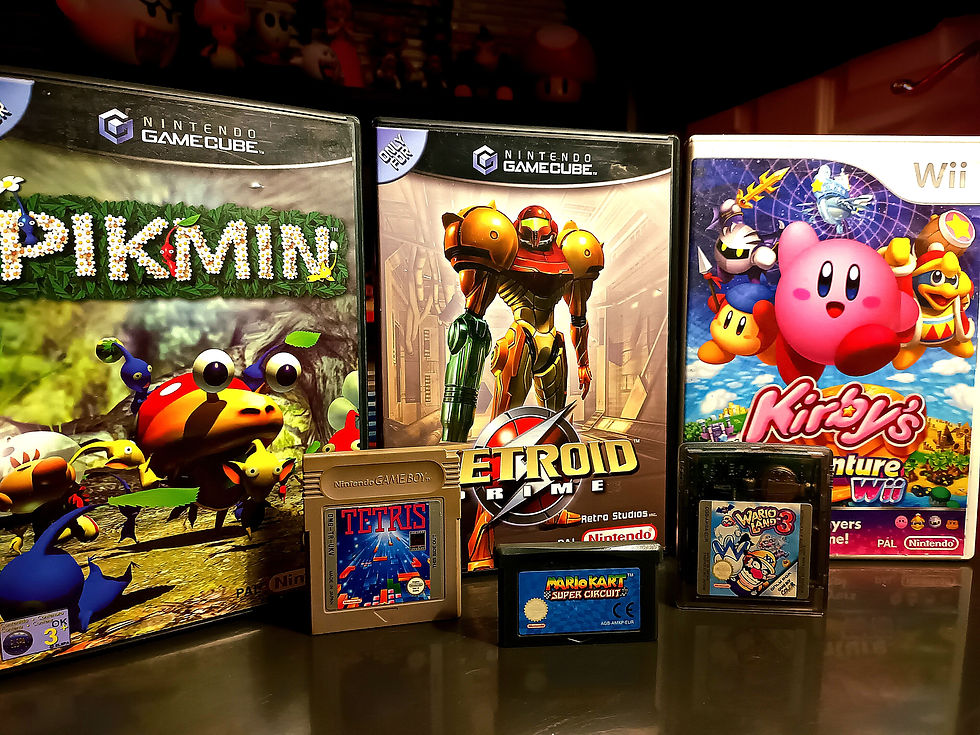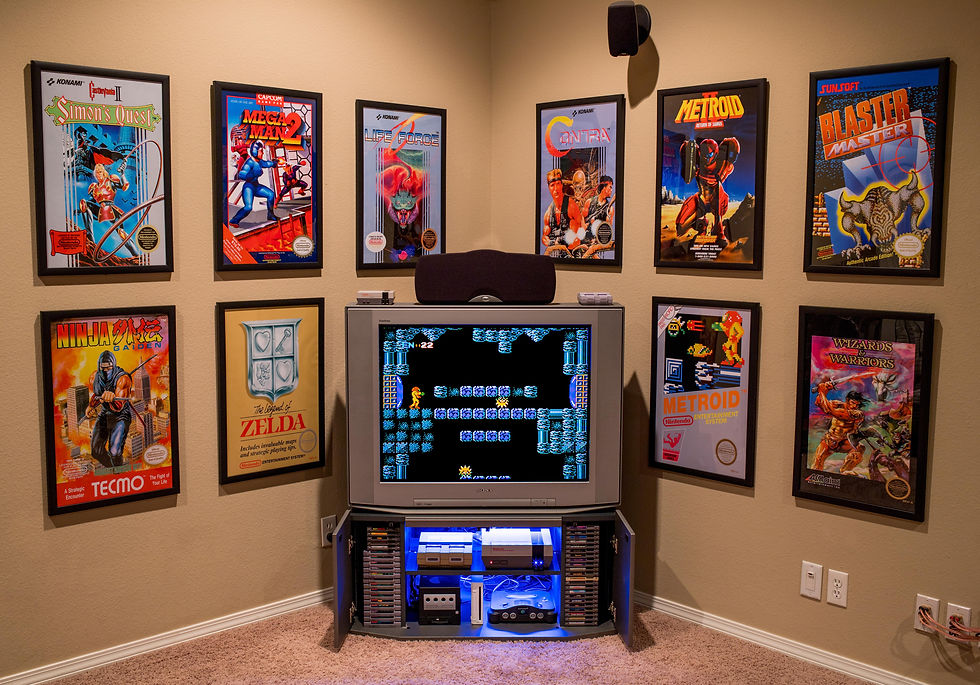Retro Game Collecting- Is there a ‘right’ way to do it?
- Sam Cawley
- Mar 8, 2023
- 5 min read
Retro gaming is more popular than ever, with more and more people revisiting some of their childhood games, or experiencing them for the very first time. Alongside this resurgence of old-school media, discussions and debate on how we play retro games has created divides in the retro gaming community.
With this in mind, I thought I’d share my experience of collecting, and explore some of the ‘options’ available to those wanted to dive into the past through retro games and consoles.

My experience with retro gaming
I got into the retro side of videogames a few years ago. At that time the only console I had was an Xbox 360, but as a child I played the Nintendo GameCube, Nintendo Wii, DSi and my GameBoy Advance Micro. As I got older I decided “Nintendo is for kids” and got an Xbox 360 and followed it through all the way to the release of the Xbox One.
It was around this time that I found my old GameCube at my aunt’s house, and after an afternoon playing games from my childhood like Sonic Heroes, Mario Sunshine, Luigi’s Mansion and more, I decided I wanted to experience more of the games I didn’t get chance to play as a kid.

After expanding my GameCube library with games like Resident Evil, Pikmin, Metroid Prime, Wave Race and other ‘must-have’ titles, I moved onto GameBoy games, then the NES and SNES Mini, then a real NES and SNES, then Sega Megadrive, and before I knew it I had a near-full collection of consoles.
The rest is history, I’m slowly building my library to this day, branching out to consoles I never thought I’d touch like the Sega Saturn or Dreamcast, and it’s probably one of the best decisions I’ve made. While I still keep up-to-date with modern releases on my Xbox Series X, the joy and memories I’ve made from playing some of the most influential and creative games of all time has given me a newfound appreciation for what games are today, and how far they’ve come.
But enough about me, let’s take a look at the different ways to experience retro gaming, their pros, cons and what the general consensus of them is.
One side of the coin- Original game, original hardware, original experience
The biggest barrier to someone wanting to get into retro gaming is acquiring the hardware and games and there are several reasons for this.
First of all, it’s expensive, especially nowadays where there’s seemingly constant misunderstandings about the actual worth of certain consoles and games. A common misconception is “if it’s old, that means it’s worth a lot”, which is why you’ll sometimes see sellers on Ebay trying to charge £50-100 for a SNES game, typically alongside a description that reads “won’t negotiate on price, I know what I’ve got.” Now don’t get me wrong… some games are justified in their, frankly extortionate price tags, which I’ll get to in a minute… but there’s a lot more to consider than just the age of the cartridge or disc.

Supply and demand plays a big part, as there’s just not enough to go around and you’d better believe some sellers are going to take advantage of that logic. The trick is to shop around, follow patterns in prices, and if in doubt, ask around on what a good price would be for the game you’re after. There’s an entire market to retro gaming, and you’ll likely have to get a good grasp on it if you want to build your collection quickly/effectively.
The second problem is something I touched on earlier, supply and demand. There’s a finite supply of physical copies, and the numbers are only getting smaller. Retro games are upwards of 20-40 years old by this point and nothing lasts forever. Just the other week, my Sega Saturn died. I took good care of it and played it quite frequently but in the end, it just gave up and was unfortunately beyond repair so I had to replace it.
It’s a sad truth that some old consoles and games will just burn out at some point, which in my opinion makes them even more precious and worth preserving for as long as possible but I can understand if that’d deter some people.
The third and final problem, and one I’ve struggled with for a while, storage. You need space for the consoles and games to go, and if you’ve got a lot of systems like me, it’s very easy to get cluttered. My end goal is to have a full-on gaming room in the future, lined with shelves filled with gamers, a modern and CRT TV ready to go, and all my consoles easily accessible to hop on and play whenever I feel like it. It’s a nice end-goal, but for some, the spacial requirements might be a bit much.

Regardless of those problems, I’ve never regretted collecting retro gaming stuff, and in my opinion, there’s no better feeling than plugging in an NES, sliding in Punch-Out and playing on a monitor as authentic as possible for the full old-school gaming experience.
The other side of the coin-emulators and re-releases
Of course there are other ways to experience some of gaming’s historic hits. Through the power of technology, emulation makes a fine option for tech-savvy PC users, allowing access to basically any game, with a multitude of settings and additions, such as save-states, graphical settings, controller layout customisation and more.
While this isn’t technically legal (when you do it yourself…) it’s a cost-effective option that doesn’t require much brainpower to figure out, and there’s plenty of guides online to teach you how to emulate a variety of consoles.
However, if you don’t want to be a pirate, you can play emulated games through more official channels, as game companies are consistently re-releasing their old titles through subscription services, and buy-to-own single games and collections. A good example is Nintendo, who currently offer access to NES, SNES, N64, Game Boy and Game Boy Advance games through their Nintendo Switch subscription service, Nintendo Switch Online.

Re-releases and collections are another way of experiencing old games, and unlike Nintendo Switch Online, once you buy them, you own them forever. These tend to include some of the biggest franchises in gaming, like Sonic, Mega Man, Resident Evil, etc so if you’re looking for more niche titles, you’re not likely to find them.
Emulation is a superb way of experiencing these old games, and while I don’t use it myself, I can see the appeal, whether you’re looking to play a lot or a few games you’re interested in.. Having an entire library easily accessible on a single device, along with all the bells and whistles and freedom to customise your playstyle is definitely an incentive, I just prefer playing them on the original console with the original controller.
What’s the definitive way to experience retro gaming?
So, with all that considered, what is the single definitive way to experience retro gaming?..
The answer… is anyway you want to. There’s a lot of stigma on both sides of the argument, with many believing original hardware is the best and only way to go, whereas others consider emulation the smarter and superior option.
While both sides have their benefits, it really depends on the individual and what you’re most comfortable with. I love collecting physical games and consoles, but I own a lot of old-school games digitally through re-releases or collections, so you can absolutely have the best of both worlds if you want it.
If all you care about is actually playing the games, then emulation is probably right for you, but if want to fill out a shelf of gaming history and have a desire to preserve old-school media like I do, physical collecting is absolutely what you should go for.
What’s most important is to do what makes you happy, and not get bogged down by alternative opinions from purists and emulators, game collecting is supposed to be a fun hobby, not a chore or measuring contest.
Hopefully this incessant rambling hasn’t been meaningless and helps somebody out who’s on the fence about collecting or even a longtime retro game enjoyer looking to try out something new!




Comments